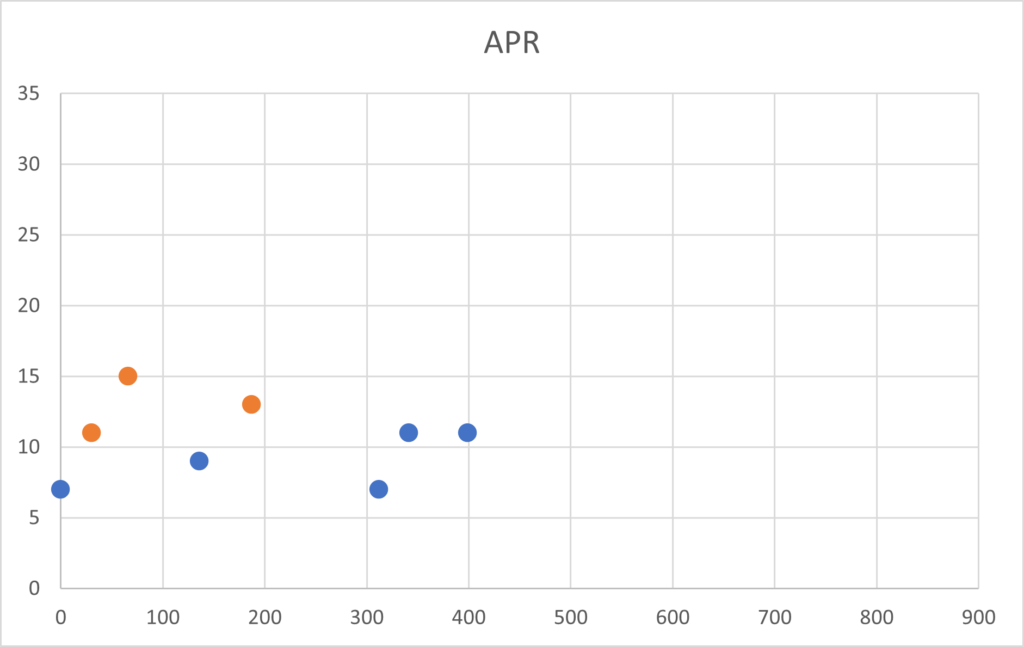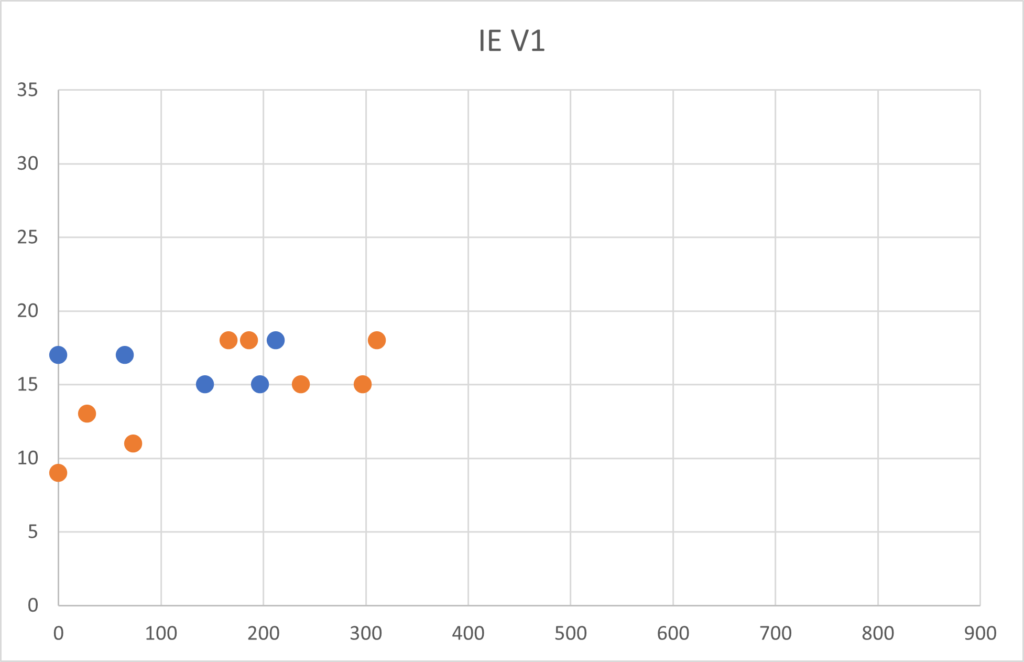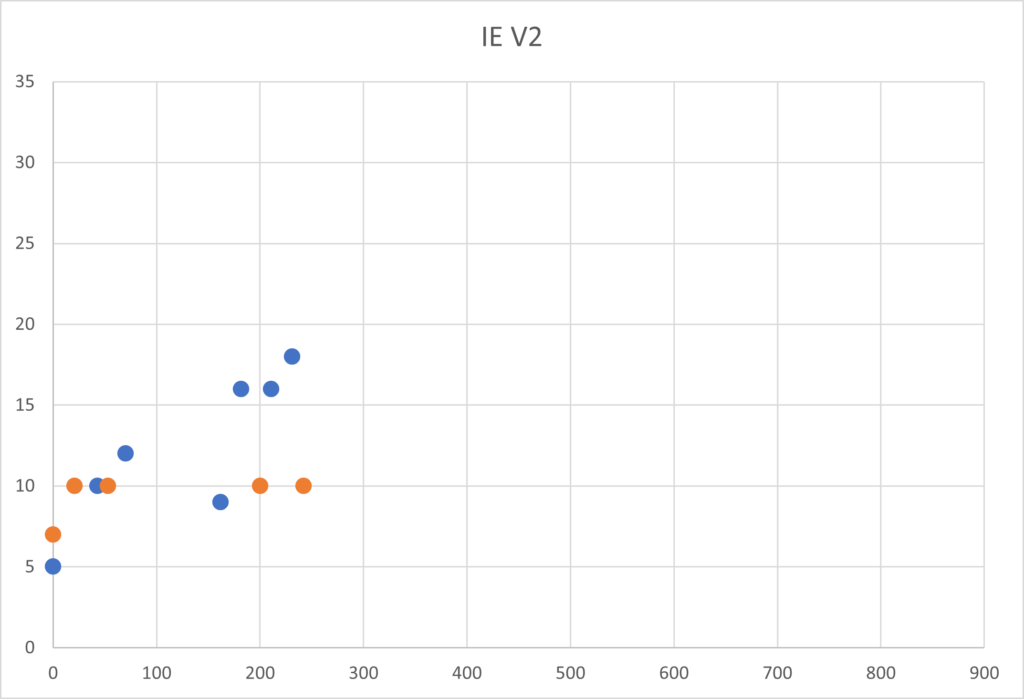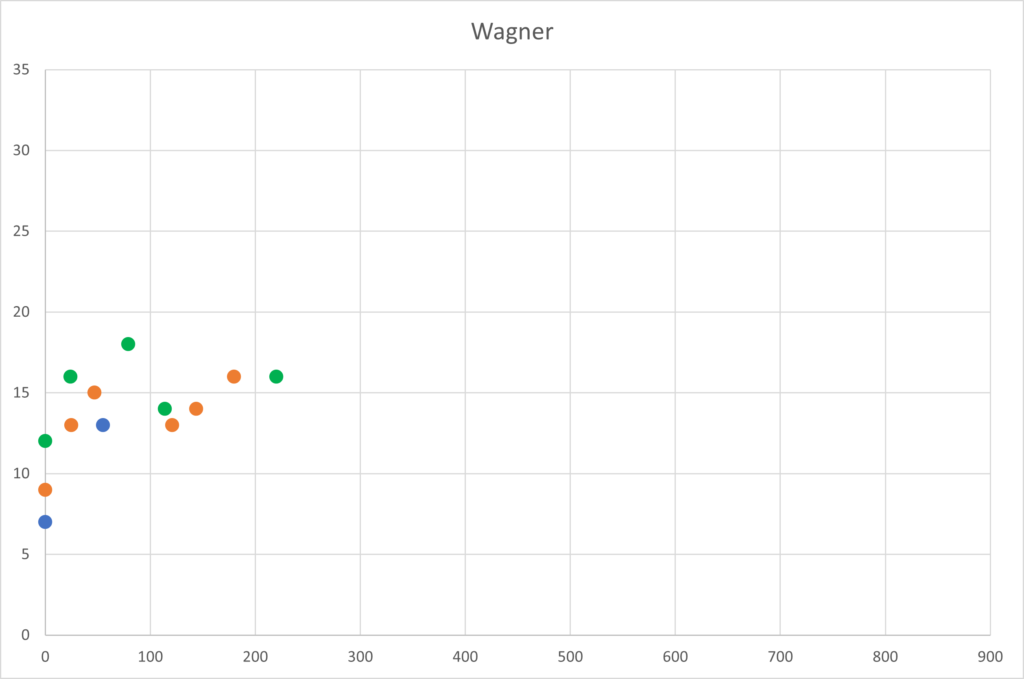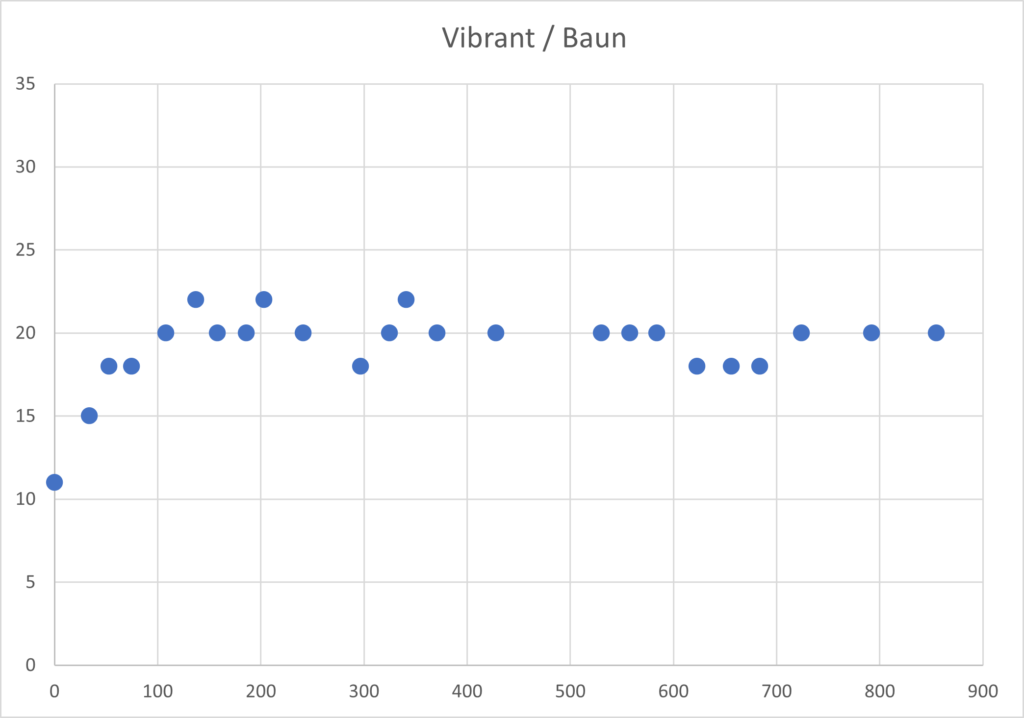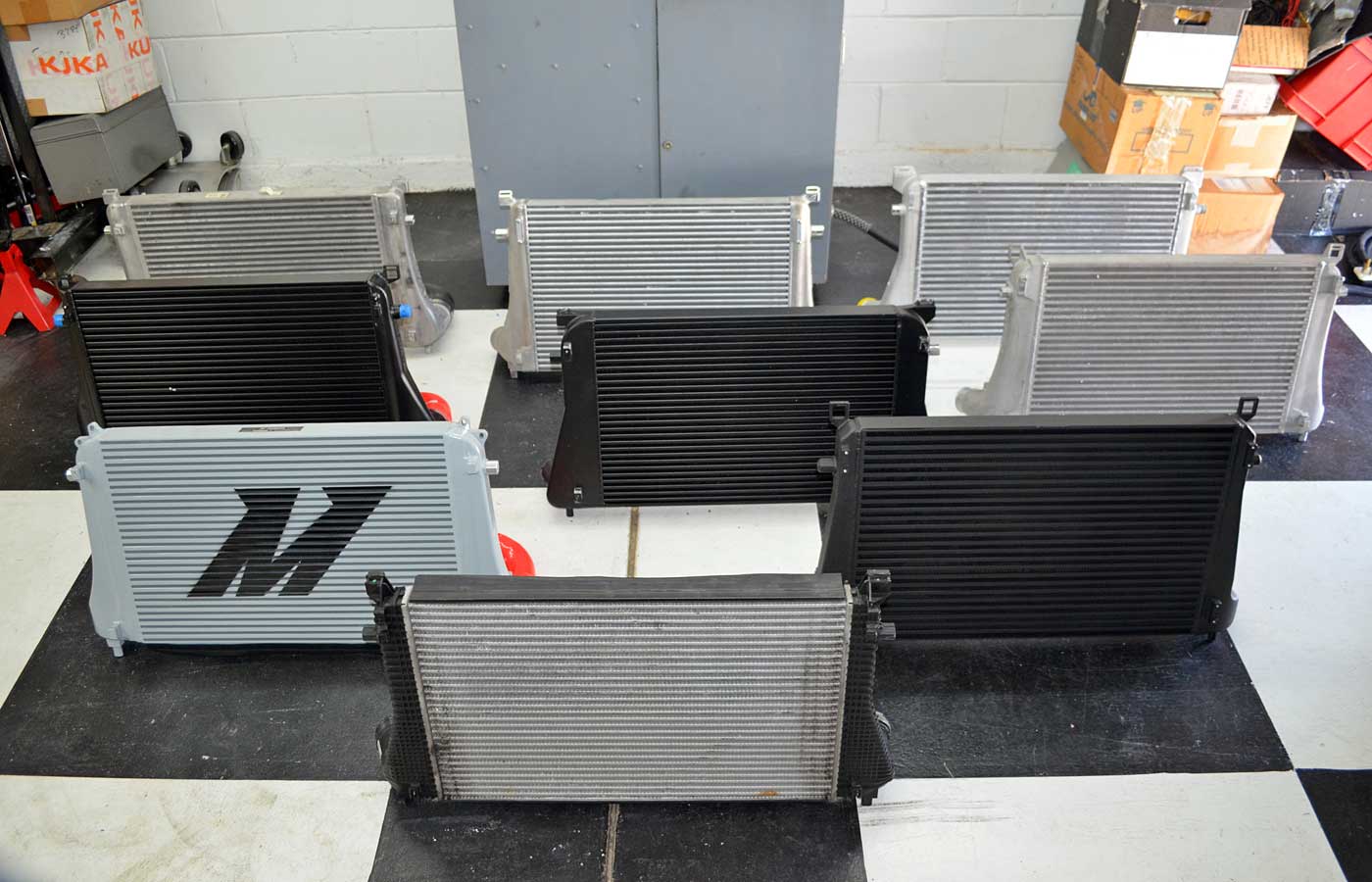
Table of Contents
1.0 Background
1.1 Summary
This test project is being undertaken in support of a goal to equip my golf Mk7 GTI with the “best” Air to Air Intercooler. The word best is in quotes since what is best is defined by goals that can be different based on individual owner prioritization of multiple factors.
1.2 Previous Test Results
- Supplier testing is a source of partial results for some products.
- Owner operating data is also available but subject to wide variations in collection and operating methods in addition to vehicle and recording equipment.
- Flowbench testing and in-use operating data have been recorded for a small number of products.
2.0 Purpose of Test
Determining what intercooler, or combination of intercoolers in the case of bi-coolers, available for the Mk7 GTI offers the best combination of cooling capability and low-pressure drop is the objective of this test.
3.0 Systems under test
3.1 Intercooler
The Mk7 GTI utilizes an air-to-air intercooler that is located between the vehicle radiator and air conditioning condenser and is the subject of this test. There are a number of aftermarket intercoolers that replace the stock GTI intercooler. Another intercooler option is located in front of the air conditioning condenser. Options for this intercooler function are both independent of the stock intercooler, bypassing it entirely, and in parallel with the stock location intercooler, referred to as a bi-cooler.
3.2 Test Item
As of April 2, 2021 intercoolers that are to be considered are identified by vendor name and are as follows:
- OEM Mk7 GTI
- 1stRacingUK (eBay)
- Majesty FMIC
- Vibrant 12810 FMIC
- Neuspeed FMIC
- Treadstone TR8L FMIC
- Treadstone TR8C FMIC
- PTE FMIC
- ARM FMIC
- AMS
- APR
- CTS
- do88
- Forge
- IE v1
- IE v2
- Mishimoto
- Unitronic
- Majesty stock location
- Wagner
Other options:
- Airtech
- Burger
- HG Motorsport
- HPA
- Leyo Motorsport
- MTC
- Racingline
- Revo
- Pro Alloy
- PWR
3.3 Test Instrumentation
Temperature measurements will be made using the vehicle’s built-in sensors along with Resistance Temperature Detectors (RTD). Pressure measurements will be made using the vehicle’s built-in sensors and a 3 Bar MAP sensor. Airflow measurements will be made using a PTS flowbench and digital manometer.
4.0 Scope of Intercooler Test
4.1 Test Environment
Measurements of temperature with an intercooler installed on a GTI will be made on public roads in central Florida. Bench tests measuring airflow and temperature will take place in a garage, also located in central Florida.
4.2 Test and Test Conditions
- Loop drive – A predefined route that facilitates repeatability and exposes the intercooler to a range of different street operating speeds.
- Third gear acceleration – Full throttle acceleration in third gear up to a minimum engine speed of 6000 RPM.
- Bench cooling test – Test of the intercooler cooling performance outside of the vehicle.
- Bench pressure drop test – Test of the intercooler pressure drop performance outside of the vehicle.
4.3 Test Criteria
4.3.1 Assessment Standards
Success / Failure criteria – Products will be evaluated for performance differences relative to other products. There are no predetermined baseline values against which the products will be evaluated. As data is recorded average values will serve as a quick check of success, performing better than average, and of failure, performing worse than average.
Charts will be the primary means for presenting relative performance data.
4.3.2 Completion Standards
Testing will end when the cooling and airflow data gathered is sufficient to support a conclusion about the best-performing product of those that are available to be tested. Product availability is expected to be a limitation of this test project.
4.4 Limitations to Scope
There are several operating conditions that an intercooler could be subjected to that will not be evaluated during this test. Some examples are quarter-mile drag strip full-throttle acceleration, 60-130 miles per hour full throttle acceleration, road course, and autocross.
There are several aftermarket intercoolers available for the Mk7 GTI and it is expected that not all will be made available for testing.
5.0 Method of Intercooler Test
5.1 Test Methods and Procedures
Testing will consist of estimation analysis and performance analysis.
More details about the methods and procedures used will be provided on individual product test pages..
5.2 Support Requirements
Access to candidate intercoolers will be important to determine the range of performance available and average performance values.
6.0 Project Management
6.1 Supplies
All products tested and testing equipment are supplied by the test conductor with the following exceptions:
- do88 Performance – provided their MQB intercooler and hoses for this project.
- Forge Motorsport – provided their VW Golf Mk7 upgraded intercooler and Twintercooler.
6.2 Reports
6.2.1 Product Test Results
Links to individual test results will be made here.
Stock GTI
- Stock and Unitronic intercoolers flow and bench cooling
- Stock GTI IC vs Aftermarket
- Is upgrading the stock IC required?
- Stock Mk7 GTI – with IS20
1stRacing UK
AMS
APR
ARM
- ARM FMIC Flow Test
- ARM FMIC Bench Cooling
- ARM FMIC Street Data
- ARM FMIC Hybrid Turbo Street Data
- ARM Competition FMIC Flow Test
- ARM Bicooler Street Data (IS38+)
- ARM Bicooler Street Data (Hybrid turbo)
Baun / Vibrant
CTS
do88
ECS
- ECS FMIC Flow Test
- ECS Tuning FMIC – Street Data
Forge
G-Plus
Golf R
HPA
Integrated Engineering
- Integrated Engineering V1 Flow Test
- Integrated Engineering V1 Bench Test
- Integrated Engineering V2 Flow Test
- Integrated Engineering V1 vs V2 Bench Test
- Integrated Engineering V1 vs V2 street comparison
Mabotech
- Mabotech stock location flow test
- Mabotech Race Bicooler flow test
- Mabotech stock location Street Data
- Mabotech Bicooler – Street Data Collection
Majesty Competition
- Majesty Competition Flow Test
- Majesty Competition – Street Data
Mishimoto
Neuspeed
Treadstone
- Treadstone TR8C flow test
- Treadstone TR8C – Flow test #2
- Treadstone TR8C – Street Data
- Treadstone TR8-24C Flow Test
- Treadstone TR8-24C Street Bicooler Test
- Treadstone TR8L flow test
- Treadstone TR8L street data
Unitronic
Wagner
Miscellaneous Comparisons
- APR vs Unitronic street comparison
- APR vs IE street comparison
- Bicooler vs Stock GTI IC
- Bicooler vs Aftermarket Stock Location IC
- Tube and Fin Stock Location Comparison (AMS vs do88 vs HPA vs Wagner)
- Pull Temperature Progression Comparisons
- Tube & Fin vs Bar & Plate Temperature Recovery
- ARM (FMIC) vs do88 (SMIC) comparison
- Baun Performance (FMIC) vs do88 (SMIC) Street Comparison
6.2.2 Test Result Summary
Summary charts will be presented here.
Note: All data points for each stock location IC are shown on this chart by the gray circles. The dark square is the sample average.

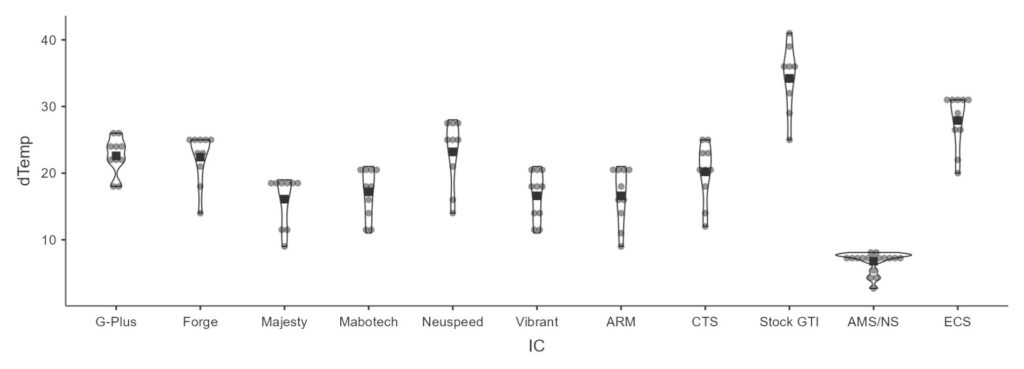
The following chart shows pairings of aftermarket stock mount ICs with front mounts.
Note: No effort has been made to control for turbocharger, boost pressure, or ambient temperature. This chart should not be used for direct comparison.

Summary of flow bench airflow testing:
Note: Airflow is correlated with pressure drop, an important attribute of IC performance but not the only consideration. Airflow is less correlated with cooling, another important attribute. Don’t rely only on airflow when considering these products unless cooling is unimportant to you.
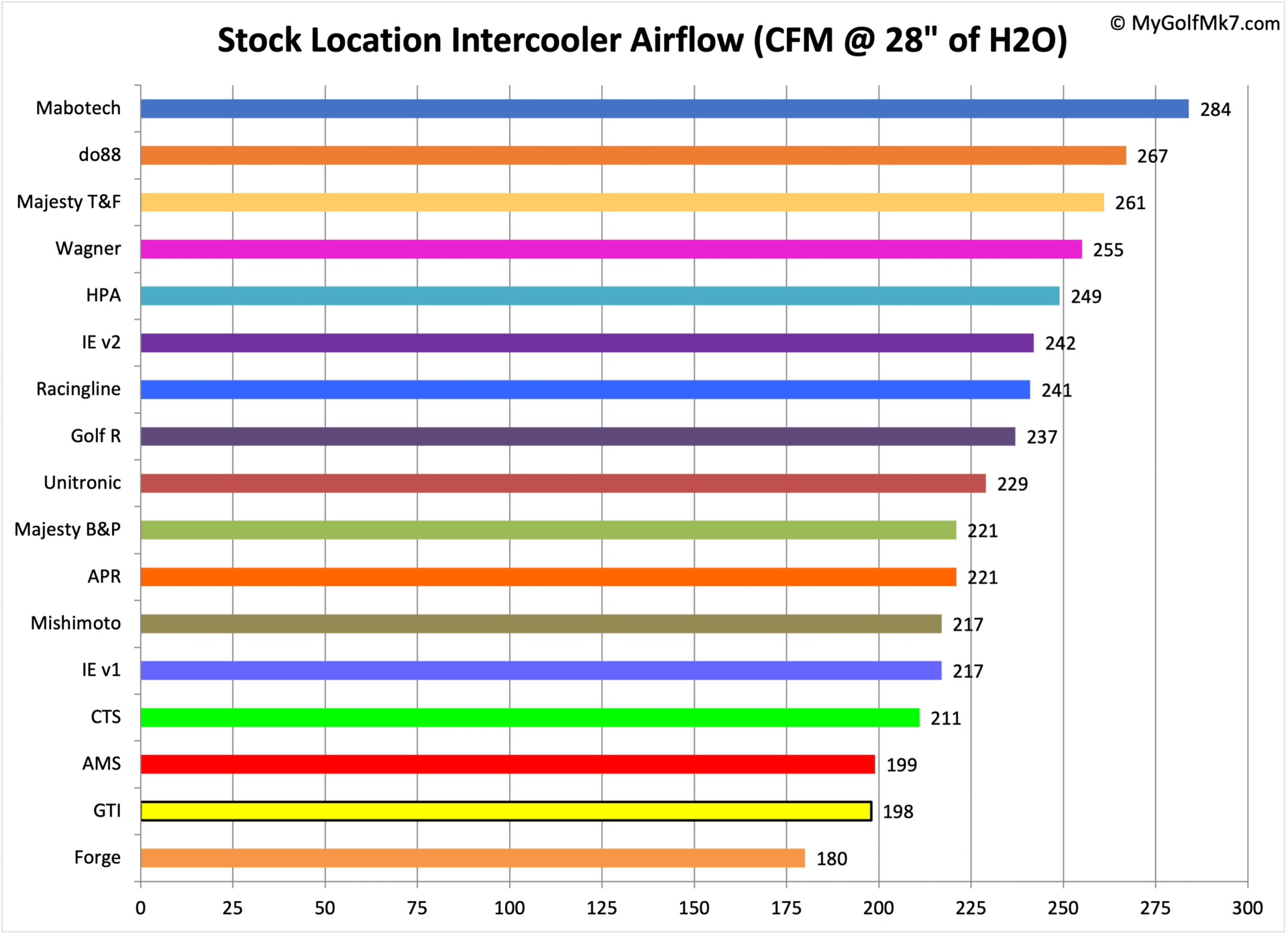
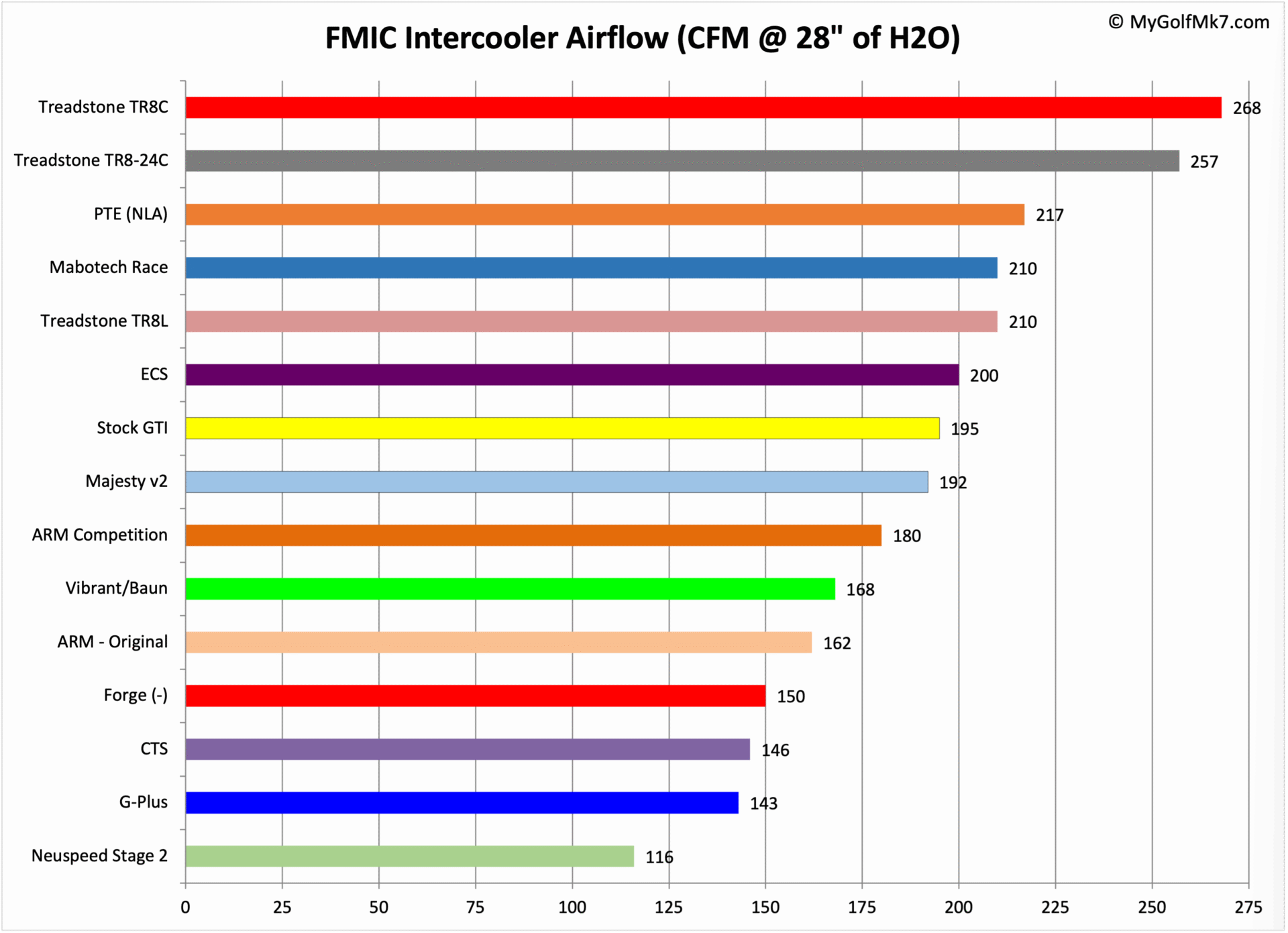
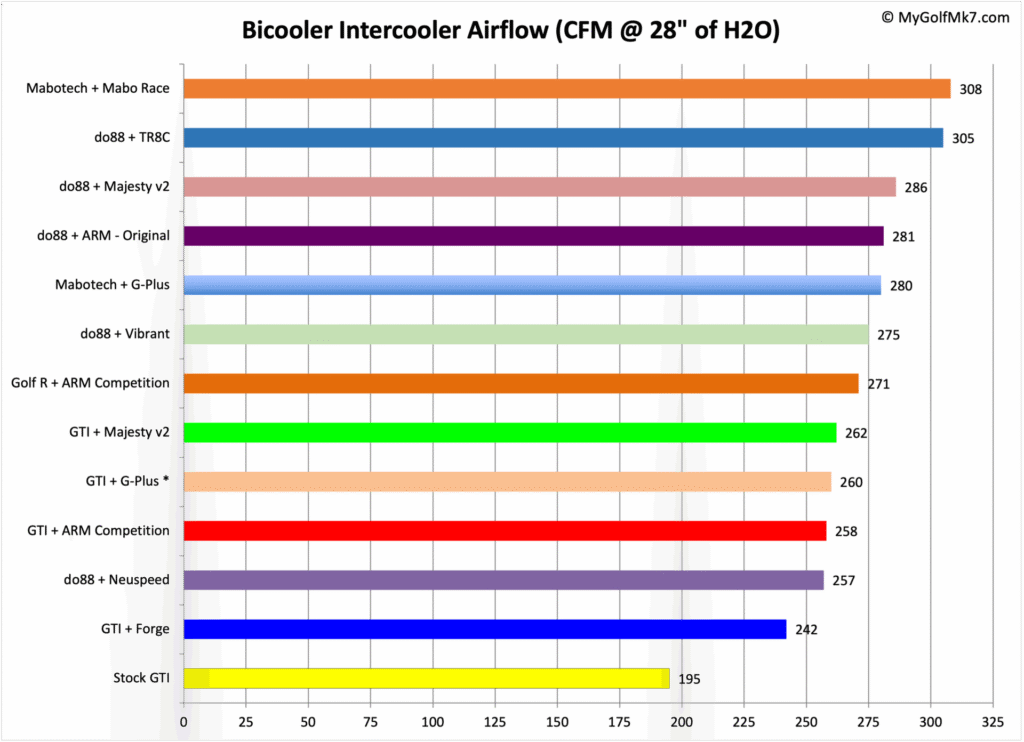
Bench airflow versus operating pressure drop:
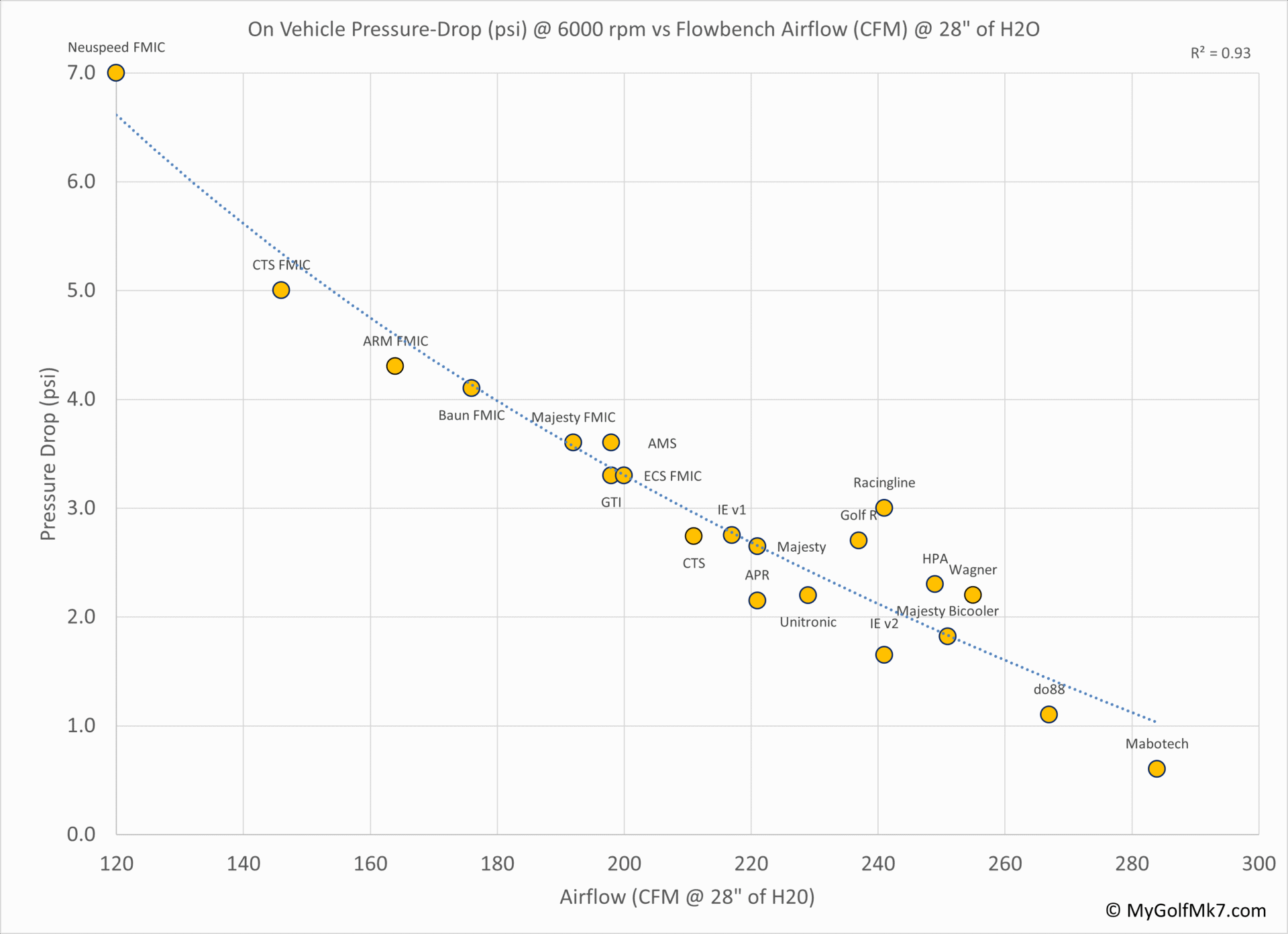
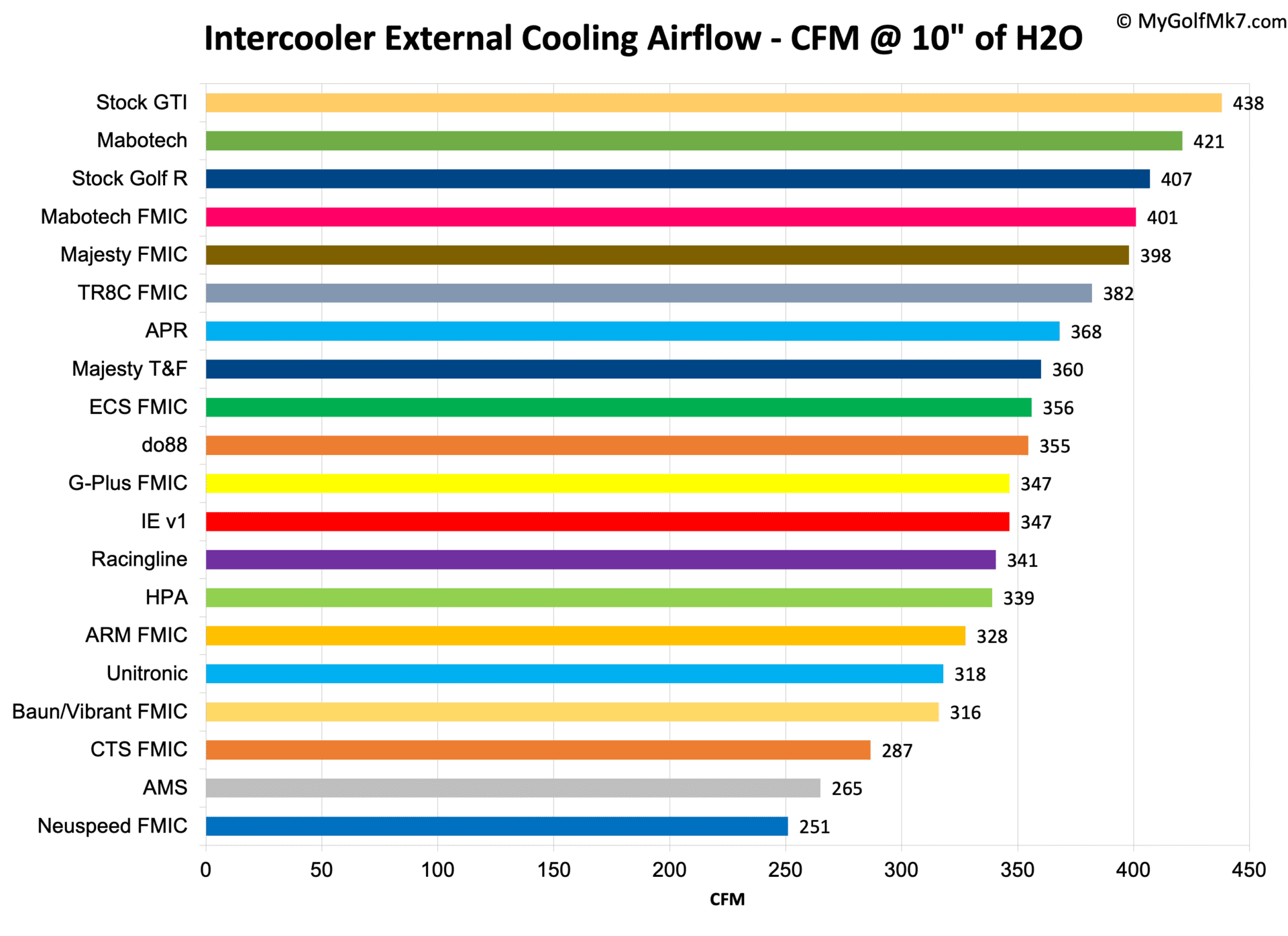
Pull series temperature delta trend.
Temperature rise trends by intercooler type:

The chart above shows how the intercoolers I have tested compare on average during a third gear pull. There have been twelve (12) stock location ICs, six (6) front-mounted ICs, and eleven (11) bicooler pairs tested.



